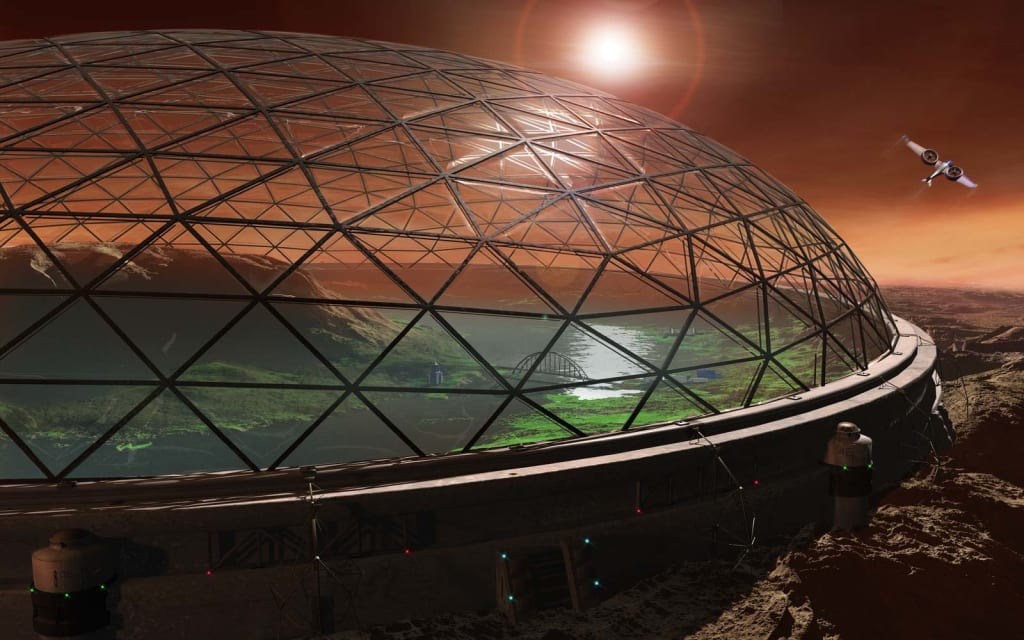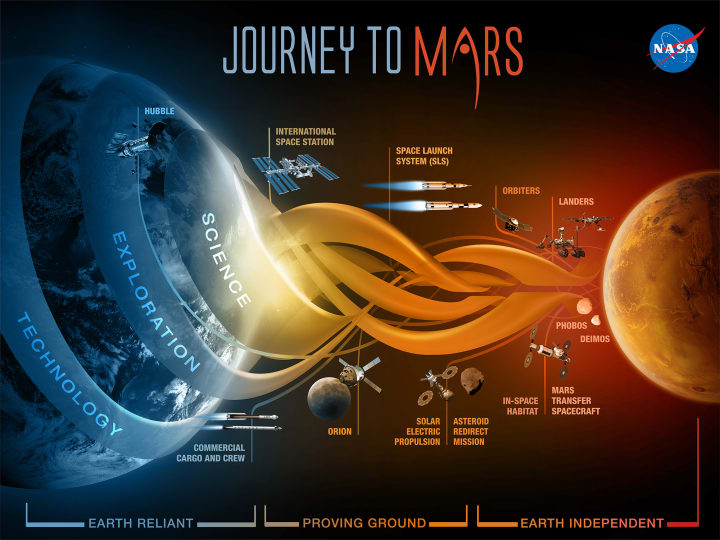
It's a mere dot in the night sky, nothing more than a speck 2,106 miles away from us, holding up two satellites of its own while spinning at about 24 kilometers per second. Mars, the red terrestrial planet whose very existence has given us both a feeling of literal warmth and extreme high hopes, unfortunately has an atmospheric pressure of 0.636 kilopascal and a composition rating of 95 percent carbon dioxide. Add that to the near extreme distance of utter darkness separating it from us, Mars oftentimes seems like a singular part of our own existence yet to be accurately unraveled.
With movies like Total Recall and The Martian boasting of the extravagant beauty withheld on Mars' unknown surface of red dust, it's hard to believe there's no life or water to be found there. Not one single human eye has ever laid witness upon its red sand dunes and high sloped terrain in person, which begs the question of its livability. There's also an extensive list of debates into the science and history surrounding its planetary existence. But, will we ever see it in its fullest capacity? You see, that's the ultimate question. Mars may be so wonderful and magnificent to behold on paper or through a lens, but will we ever vacation on Mars? NASA actually plans on going there within the next decade or so, in addition to a number of private corporations, but if it's really viable and if it's truly plausible still reminds uncertain.
The Space Between Us

The truth is definitely out there, but how far can we truly extend our reach? Ethical traveling is an important concept to behold when delving into the future of Mars. Interstellar journeyman would have to worry first and foremost the distance and time of the flight itself. For astronauts working under NASA, anywhere from 300 to 360 days in space is the limit. NASA also warns of high radiation, fluctuating pressure, extreme temperatures, and more. Not to mention an accumulation of mental stress, isolation, claustrophobia, weaker muscles, and so forth, a trip to Mars may not be the vacation of your dreams.
So, will we ever vacation on Mars? Interestingly, we already have people planning their lives around this apparent one-way trip. Vacation, or not, Mars is the literal future for some. A future where their lives will forever be held within a bubble. If that's not downright hampering to think about, try calculating the risk of failure for merely traveling there. Though you may be dying to get your hands on a ticket to the martian world, first understand the unimaginable risks accompanying the journey alone. Oh, did I mention there's such a thing as space sickness?
A Flight, Trip, and Mission to the Red Planet
People have been asking the question will we ever vacation on Mars for decades, but one CNN article, titled "More than 100,000 want to go to Mars and not return," was published in 2013. It states:
"Out of the applicants, Mars One said it will select a multicontinental group of 40 astronauts this year. Four of them — two men and two women — are set to leave for Mars in September 2022, landing in April 2023."
Mars One is a colonization project, held by CEO and co-founder Bas Lansdorp, intended on reaping the red planet of its immense and immersive amount of space. Despite the relative dangers of not only spaceflight but Martian livelihood in general. Lansdorp expects to hold eight missions, each bringing with them well over 5,000 pounds of useful materials, such as food, solar panels, and even oxygen, to their particular landing site.
Lansdorp's Mars One mission isn't the only one. In addition to NASA's particularly audacious 2030s mission, Inspiration Mars has made its own plans on traversing to the red planet and back with only two astronauts for a total of 501 days. Jane Poynter, president of the Paragon Space Development Corp., hopes to launch in 2018. In regards to finding the right pilots, she told CNN, "We've got to select for people that can maintain upbeat and happy attitude in the face of adversity and that are resilient."
Whether it be two people or 100,000, vacations to Mars have long been in the workings. Though, then again, are they really vacations? NASA aims to bring about a shift in gears, instead of harkening on human life and colonization of the solar system, NASA intends on gazing more deeply into the planet's scientific makeup, as well as digging into our own intrinsic closeness with the martian planet.
Conquest of Space

While Mars may have once carried life over four billion years ago, it now operates almost soundlessly. Deep space missions there will require a lot of manpower, funding, and overall general support, for which is highly unlikely. Space agencies have been attempting to bring about some kind of revolution in the general missions parameters to Mars, but much has fallen by the wayside, what with exponential costs and minuscule political support. However, when fully explored and understood, Mars could eventually uncover deeper secrets of our past, or even the very future of humanity in its entirety. The conditions and hypothesis presented by a trip to Mars are, quite honestly, endless.
For nearly 40 years, NASA has been sending probes and robots to explore the surface of Mars, capturing its incredible life with intense clarity. Not only that, but the studies being done on Mars' surface have, in great proportion, shown us much more about our own earth that we had not yet known. Bringing us even closer, astronauts on the International Space Station preform their laboratory studies in order to unlock the unfathomable and still unanswered questions left remaining in the darkest parts of our cosmic neighborhood.
Though NASA's journey to Mars first begins with an asteroid trip in 2025, then to Mars in the 2030s — vacationing there anytime soon is most probably a hard no. One day, far down the road, it will certainly be viable. When high propulsion rockets, quantum technology, and advanced life support systems have all been engineered, the future of spaceflight will be rendered far too easy — making a vacation to Mars not only penniless, but priceless all the same.
Just Imagine
A trip to Mars, minus all of the deathly risks and years of traversal, would cost somewhere in the billions. Despite this, some companies are attempting to make space flight a little easier and cost effective, like UK's Skylon project. With boosters that burn both hydrogen and oxygen, simultaneously cooling incoming air at 140 degrees Celsius so as to utilize its lightweight materials, the Skylon rocket can take off from a runway and go directly into earth's orbit, bypassing the need for external rocket boosters. Though it's still in development, the possibilities behind Skylon's engineering are remarkable and interestingly futuristic, giving us all newfound hope in the nature of continued spaceflight.
Other than the Skylon project, other such ideas centering on more affordable and more accessible spaceflight is still underway. One such theory is using airships, or balloons filled with either hydrogen or helium, that can rise indefinitely. JP Aerospace is currently building said airships that could potentially rise up to the mesosphere, or to about 200,000 feet, leveling off near vacuum conditions with special orbital platforms. There's also talk of building something like a launch loop, or a Maglev train, that can accelerate without fuel so fast it exerts zero friction at mere kilometers per second. Though, we are still many years away from even having the right technology for this, as many stipulate it would cost somewhere around $20 billion to craft.
Alas, a flight to Mars might not actually be as viable as you may have hoped. While it may be an awesome addition to the best rock climbing destinations, vacationing on Mars has a few difficulties. Whether or not these difficulties will eventually change in the future is still left to be seen, but the ultimate question of will we ever vacation on Mars is as simple as tapping into our own imagination. Ideally, you can take a vacation to Mars whenever you want, you merely need to use your imagination to get there.
About the Creator
Ryan Epps
A cosmic adventurer rendering wayward letters into infinite lengths of conception and prose, like quantum streams of pneumatic information






Comments
There are no comments for this story
Be the first to respond and start the conversation.